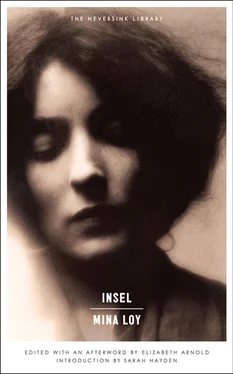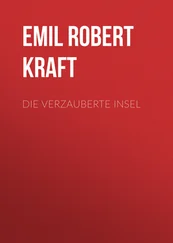EVERY NOW AND THEN THE SHARP OF HIS FLICKERING sadism, a needle occasionally picking up the dropped thread of memory, would prick through his frayed conversation, woven of disjointed themes like an inconsistent lace eked out with stocking darnings.
He recalled my promise — to demonstrate unfortunate love whenever a twinge of pain contracted my features. He peered enthralled at the havoc pain played with me. His delirious peace expanded to full blossom in the smile of Buddha. One felt his utter joy at sight of my disablement had leapt to such a blaze he must melt off it, his fragile person dissolve in his delight, were it not for some mysterious source within him replenishing the exaggeration of his unabating intensity.
“Gestatten Sie?” I inquired ceremoniously, unable to hold out any longer against the pathological rat gnawing at my entrails. And I subsided on his couch. Above a certain degree of agony, one is willing to subside anywhere. However, my slight repulsion dispersed as I lay down. Indeed, like the saints whose dead bodies did not decompose, Insel’s electric exudation in some process of infinitesimal friction seemed to cleanse him of his grubbiness of the poor, to free him of any accretion natural to normal man. His couch was almost fragrant with that faint half-holy purity that hung about him.
“What color was this once?” I asked, as I drew up his gray blanket.
“White,” said Insel.
It was incredible. That twilight sheer duration lowers upon all pale fabrics had so penetrated the thick wool, one could only believe with difficulty it had not been dyed — a perfect job at that — no spot, no smirch, no variation in tone disturbed the unity of its spread surface. For a moment I entertained the idea that Insel had worked all over it with the microscopic point of his lead pencil, for it seemed no earthly dust could defer to such patient order. Anyhow, I decided everything in the place is bewitched, and let it go at that.
Insel, intently keeping watch, had moved his stool some distance away as if to find his range for an inverted “Aim of Withdrawal.” Spinning himself into a shimmering cocoon of his magnetic rays, introvert, incomparably aloof, “They’re mine,” he exulted as clearly as if he were crying aloud.
Too simple to fully imagine the effect of these rays, he had, it would seem, only an instinctive mesmeric use for them. He might even feel them as a sort of bodily loss compensated perhaps by rare encounters with one able to tune in.
“I shall make you some tea,” said Insel affectionately, and hushed as a nurse, he began swimming about from his little sink to his wooden shelf — or as a panther softly pacing before a vanquished prey—. I noticed now, as always, whenever one encountered Insel at an angle of meals at home, there was appropriately just enough dust of tea leaves left at the bottom of a packet for brewing the last cup — he would open the door to you holding precisely the fag end of a loaf for the last bite. But today he served a minute carton from an automatic machine in the Metro. Out of it he rolled into my palm a bonbon, virulent green, less than a pea in size.
“Aren’t you having any?” I invited, convivial as a gourmet, for in his dimension this was a spread feast and the hot unsavory tea had eased my pain. The very teenyness of his sweetstuff made it more seductive than a giant Christmas cake. But he shook his head impishly in abnegation. I looked inside the carton. There was nothing left.
In the concentrated one-sided luxuriance of our party he evoked his dazzling future — the work he no longer seemed able to do waxed so sublime in his visions (and also in mine as I watched all possible loveliness evolve from his elemental mists, and the creeping to maturity of the almost invisible herbage left from under the withdrawn tide of his hovering waves).
His fame was to be fabulous, his wealth extravagant — so that at last the great Insel would (with a gleam of furtive cruelty for me) marry, as far as I could make out, so increasingly incorporeal he grew in his grand exaltation, my daughter’s photograph.
“That will be really nice,” I responded genially. “As I come to think of it a son-in-law—.”
“Exactly,” he burst out wildly. “You and I, we could have such a wonderful time together.”
“—a son-in-law with rays—” I brought up short, “—and what would my daughter be doing?” Then hurriedly, thinking to profit him by the occasion, I urged, “You must paint those pictures —otherwise, you will grow to be too old to marry her.”
“Ah, well,” he waived, with that sudden doleful look he had of gazing into an abyss when confronted with whatever imperative of whatever consummation. “No matter! It would suffice me just to know her, to have the joy of watching her evolve. It would be a very wonderful thing indeed to take part in the Entwicklung of a young creature.” And I realized there was nothing, nothing, in all the world elementary enough to serve as object for such simplified observation as his. Everything must henceforth for him drowse in an impotence of arrested development.
This very word, Entwicklung , was so much Insel’s word; its sound seemed to me onomatopoeic of his intellectual graph. For my alien ear it had a turn of the ridiculous as though a vast process had got twisted in a knot of tiny twigs, haply to unravel and root, and branch against the heavens.
I REMEMBERED THOSE STACKS OF MANUSCRIPT HE had assured me were at my disposal in the days of “biography.” “You promised to show me your notes,” I reminded him. “May I not see them now?”
He was coy about his literature, sidling alongside himself in a sort of dual fidget impossible to describe, as if doing sentry duty before his own secrecy.
After a long persuasion he brought out a blotter, the kind for écoliers sold in bazaars. Covered in black, stamped with a golden sailing ship, its funereal hue intended for neutralizing ink drops in a kindergarten, this unassuming blotter, the one thing in the place having any tradition, had a decorative air of intruding from a frivolous society. It contained a single sheet of paper which he handed me with great precaution. Very few lines were written upon it. They formed a square block in the center of the page covering little more than the area of a postage stamp.
Hardly had I caught a glimpse, when, “Can you see it?” he inquired suspiciously and snatched it away.
“How could I?” I demurred, “the words are scarcely visible—” Reassured, he gave it back to me.
“You’ve no idea,” he sighed, “the pains I take when I write to you, forcing my hand to form letters big enough for you to read.”
“ Liebe Herr Insel,” I cajoled, “You read it to me.”
At last he did so.
It was a beginning.
“ ‘My sister and I walked along the road. Coming to the town gate we gave it a good thump.’
“Do you know what a town gate is?” asked Insel professorially. “It’s like a tower.
“ ‘All the townsfolk came out of the gate, swarming about us to look.’ ”
As ever, with Insel “to look” was a deadlock, he had written no more.
I proffered the necessary compliments. Agog with glee, he shimmered with satisfaction. This communication of an actual transcription of a mental process had reinforced his sociability. His contacts ordinarily depending almost entirely on his Strahlen , for the moment our companionship was complete.
In reading aloud his manuscript he had formed an extra alliance with me — as littérateurs , producing in Insel an enormous self-respect.
Nevertheless, it was a sympathization going on in some sphere to which I had no access.
Читать дальше












